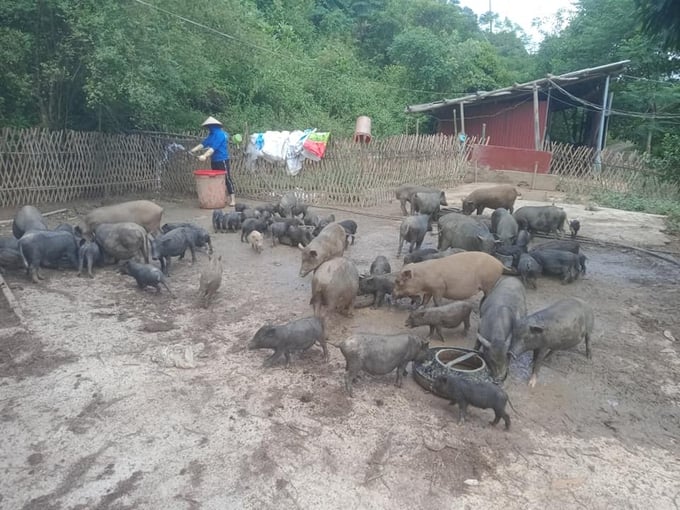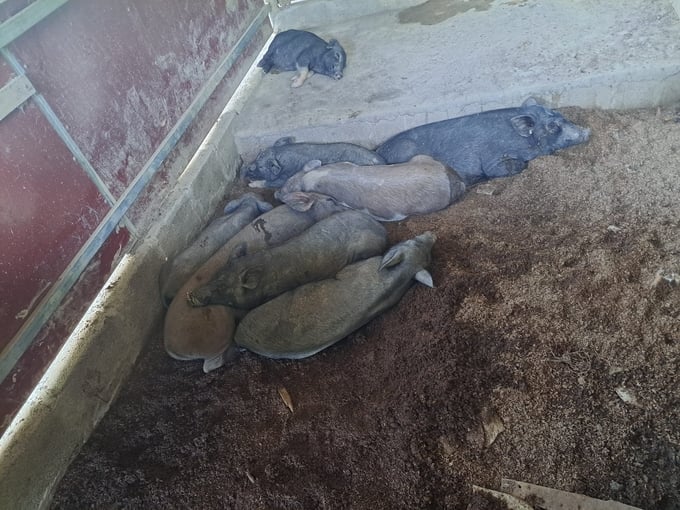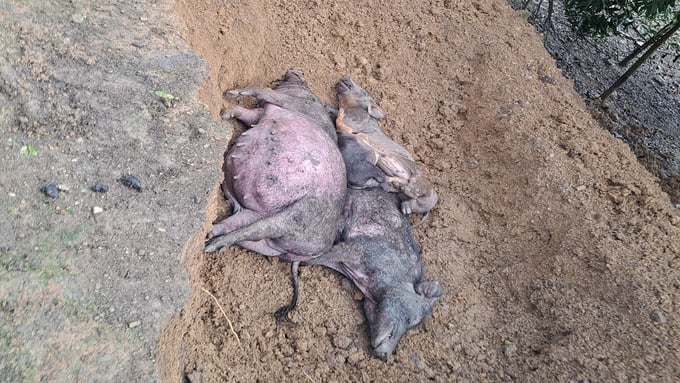May 22, 2025 | 11:26 GMT +7
May 22, 2025 | 11:26 GMT +7
Hotline: 0913.378.918
May 22, 2025 | 11:26 GMT +7
Hotline: 0913.378.918

Phan Van Tuan's herd of indigenous pigs before the African swine fever outbreak. Photo: Ngoc Tu.
Phan Van Tuan's farm, located in Tran Phu commune, Na Ri district, Bac Kan province, typically housed approximately 300 indigenous black pigs. In addition to raising pork pigs, Tuan owns 30 breeding sows. Before the African swine fever outbreak, the farm saw an annual revenue of approximately 800 million VND.
According to Tuan, his family previously purchased cars and excavators to work on construction and land leveling projects, as well as to transport goods within the district. After recognizing the region's expansive land area, temperate climate, and large market demand, Tuan decided to convert to indigenous pig farming in 2020.
His business operations saw relative success within the first two years. The farm's enclosed model facilitated effective quarantine measures, resulting in breeding pigs that are eligible to participate in local poverty reduction support projects.
"The farm was previously capable of providing nearly 300 piglets to local farmers, primarily for livestock projects under the national target program. As a result, income from pig farming was relatively stable," Tuan said.
In early July 2024, the African swine fever outbreak occurred during the height of the farm's operations. "One morning, as usual, I tended to the pens and noticed that several piglets were lethargic and refusing to eat—a troubling sign. By noon, three piglets suddenly collapsed and died. I immediately informed the local authorities, buried the pigs and disinfected the pens," Tuan recounted.
Located remotely, several kilometers from residential areas with only a secluded access road, Tuan's farm sees minimal human traffic. The farm strictly implements disease prevention measures, including regular pen sanitation and the use of biological bedding.

A dying pig herd, with only a few surviving. Photo: NT.
After surveying the gradual decline of his pig herd, Tuan reflected regretfully on the immense effort and financial resources invested into pig farming, which currently faces the prospect of ending the year in poverty. Prior to the African swine fever outbreak, Tuan's farm housed nearly 300 pigs, including 30 breeding sows, 4 boars, 100 pork pigs, and several breeding pigs ready for sale.
Isolated from neighboring farms, Tuan had not anticipated the outbreak of African swine fever within his own premises. After inspecting the pens, he estimated potential losses at several billions of Vietnamese dong. The damages in death toll amounted to approximately 700 million dong, with additional costs anticipated for the replacement of biological beddings and the acquisition of new breeding stock, which can reach several hundred million dong after the outbreak has ended.
"The most significant loss is the death of over thirty parent pigs. They were very expensive, and carefully selected from various sources, including genetic preservation centers. It would be very difficult to recover if they all die off; and no one can tell when the outbreak will end," Tuan shared.
African swine fever is sweeping through the small hamlet where Tuan's farm is located, causing a significant challenge among the local households. Tran Phu Cooperative, directed by Tuan, previously supplied breeding pigs to local households and purchased these pigs after they mature. The outbreak has disrupted this supply chain, leaving multiple households without piglets and marketable pigs.
"Occasionally, traders would visit neighboring areas to purchase pigs, but I refused them. All the dead pigs were buried after we notified the local authorities. After many years in the profession, I am aware that selling dead or diseased pigs would only spread the disease further, and endanger consumer health," Tuan added.
Formerly a renowned pig farmer in Bac Kan province, Tuan currently finds himself unemployed. His previously crowded farm has been reduced to a single sow and several piglets. Tuan does not, however, expect the remaining pigs to survive. After a year of unsuccessful business, Tuan faces the prospect of total poverty.

According to Tuan, the death toll of pigs has become so high that the local disease control team is reluctant to assist with disposal. Photo: NT.
Phuong Vien is a predominantly agricultural commune in Cho Don district, where small-scale pig farming plays a crucial role to the local community. Despite the relatively limited revenue from small-scale pig farming activities, local farming households enjoyed a stable income.
Similar to many young people in the village, Chu Van Khai, a resident of Ban Lanh hamlet, Phuong Vien commune, also engages in pig farming, albeit on a larger scale, with each batch consisting of approximately 100 pigs. Khai's pig farming model was previously a remarkable example of economic development for the local youth.
"With the family's traditional brewing practices, we produce a significant volume of distillers grains. A few years ago, my wife and I decided to invest over 300 million VND to build a pig pen. We initially raised several pigs. After a few profitable batches, we increased the yield to nearly 100 lean pigs per batch. Each year, our family earned several millions dong from selling pigs," Khai shared.

Farmer Khai dismantling and converting his pig pens to aquaculture ponds. Photo: Ngoc Tu.
Khai stated that his business operations saw relative success until early May 2024, when the African swine fever broke out in several households within his hamlet. With the disease emerging in Bac Kan province, traders attempted to purchase pigs, prompting Khai to sell off his entire herd at low prices to mitigate losses. However, this sale resulted in the loss of over 100 million VND for his family.
For livestock farmers like Khai, the devastating impact of the disease forced him to change professions. Despite extensive investments into the construction of pig pens and acquisition of machinery, unstable pig farming activities led Khai to dismantle his pens, and focus on brewing alcohol and aquaculture.
"With our family's traditional profession of brewing alcohol, there was an abundance of feed for pigs. If the outbreak didn't occur, pig farming would be our primary source of income. Sadly, we had to dismantle all our pig pens. Only a few farmers in our commune remained with pig farming; and we have no market for our distillers grains, resulting in multiple losses. If this outbreak persists, it will greatly affect the local economy," Khai commented.
Khai is currently preparing his aquaculture ponds with plans to cultivate monosex tilapia. However, he is uncertain about a source of feed for the fish without pig farming. The outbreak of African swine fever inflicted immediate losses as well as disrupted the value chain that he had built over the years. With the reduced level of local incomes, his family's production activities are facing significant difficulties.
African swine fever has affected 96 out of 108 communes and wards in Bac Kan province since early 2024, resulting in extensive damages to the local livestock industry; and plunging local pig farming households into hardship.
Translated by Nguyen Hai Long
![Reducing emissions from rice fields: [2] Farmers’ commitment to the soil](https://t.ex-cdn.com/nongnghiepmoitruong.vn/608w/files/news/2025/05/05/dsc08881jpg-nongnghiep-140632.jpg)
(VAN) Clean rice cultivation model in Thuong Tan commune, Bac Tan Uyen district, is assisting local residents in achieving sustainable agriculture by substantially reducing costs, increasing productivity, and protecting the environment.

(VAN) At the conference to disseminate Resolution No. 68, AgriS introduced its digital agricultural ecosystem and reaffirmed its commitment to accompanying the Government in promoting private sector development and sustainable agriculture.

(VAN) 'Blue Ocean - Blue Foods' initiative is designed to restore marine ecosystems and establish sustainable livelihoods for local communities by cultivating a minimum of 1,000 hectares of cottonii seaweed in the first three years.
/2025/05/21/4642-3-112707_603.jpg)
(VAN) The V-SCOPE project has made direct contributions to three out of six pillars of the Comprehensive Strategic Partnership between Vietnam and Australia.

(VAN) Facing the threat of rabies spreading to the community, Gia Lai province urgently carries out measures to vaccinate dogs and cats on a large scale.

(VAN) Disease-free livestock farming not only protects livestock herds but also stabilizes production and livelihoods for many farmers in Tuyen Quang.

(VAN) Japan's grant aid project contributes to capacity building, promoting organic agricultural production, and fostering sustainable community development in Dong Thap province.